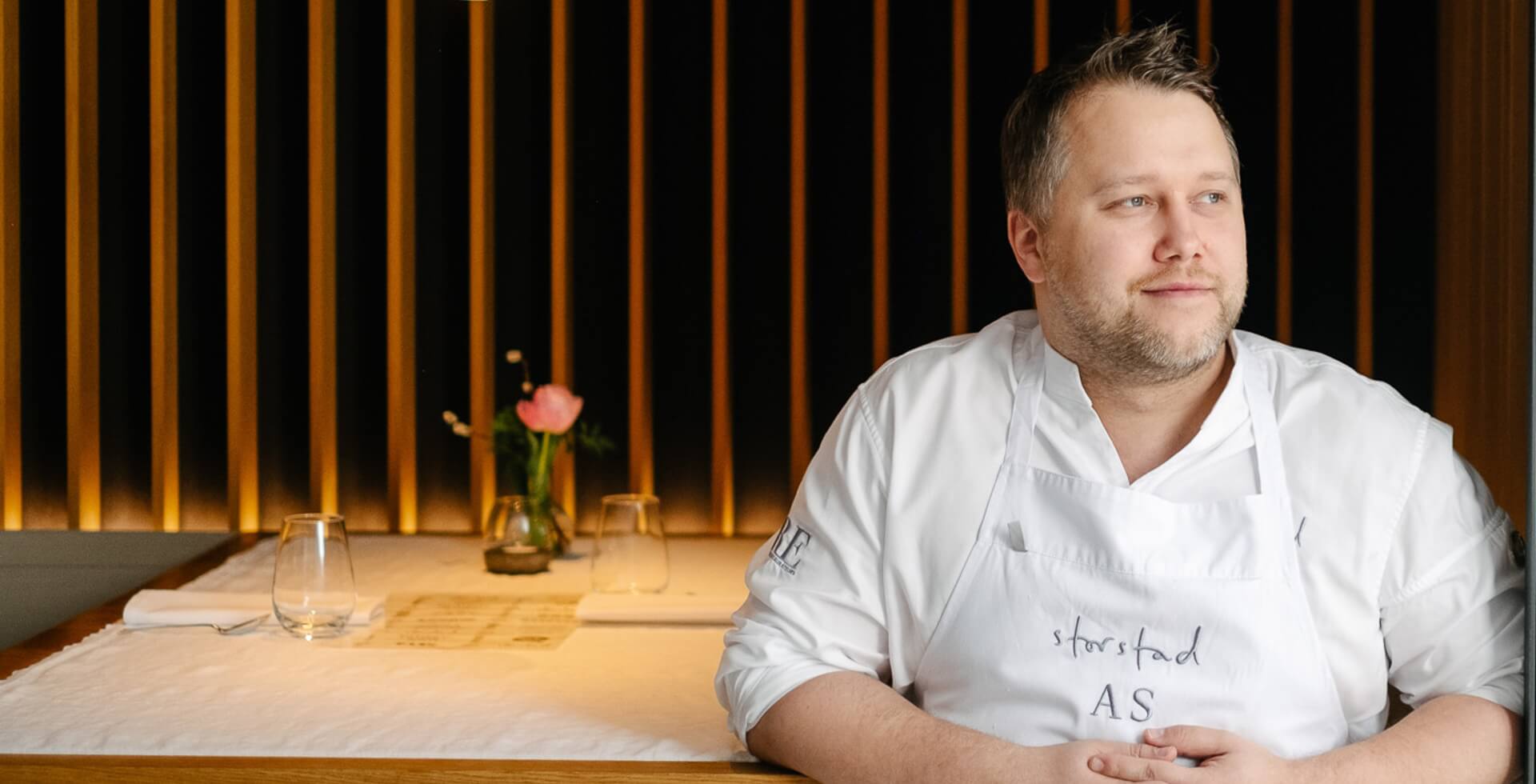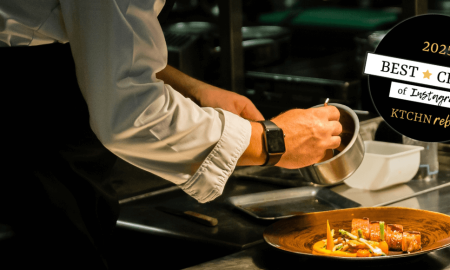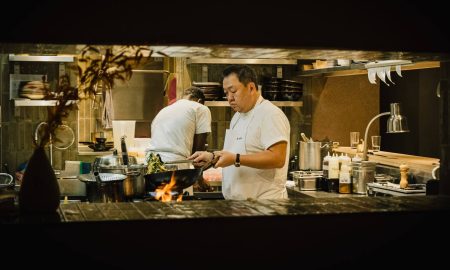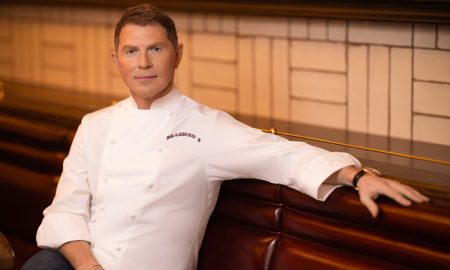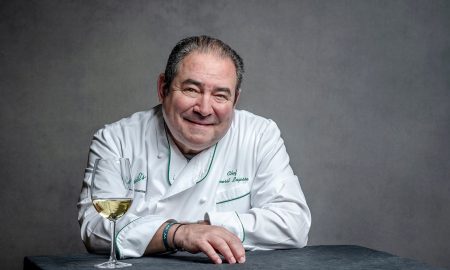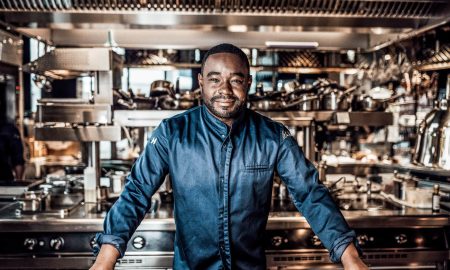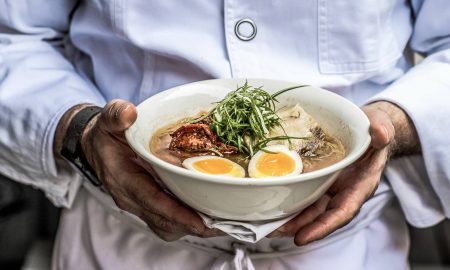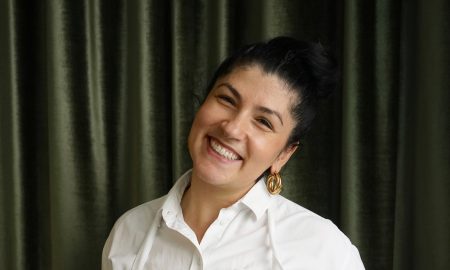In principle, he was already set: he had talent, a passion for good food, and the well-established country inn in the Bavarian Forest that had been in his family for 13 generations… since 1769. But Anton Schmaus didn’t want to lead his business in the quiet town of Viechtach into the 14th generation. The now-43-year-old Michelin-starred chef, who jokingly refers to himself as a “stubborn Lower Bavarian ox,” had bigger dreams. “At the time, the decision was certainly harder for my parents than it was for me. But they were the ones who raised me to believe that you shouldn’t do something just because it’d be easier. They instilled in me a healthy ambition to keep seeking out new challenges and carving my own path outside of my comfort zone.”
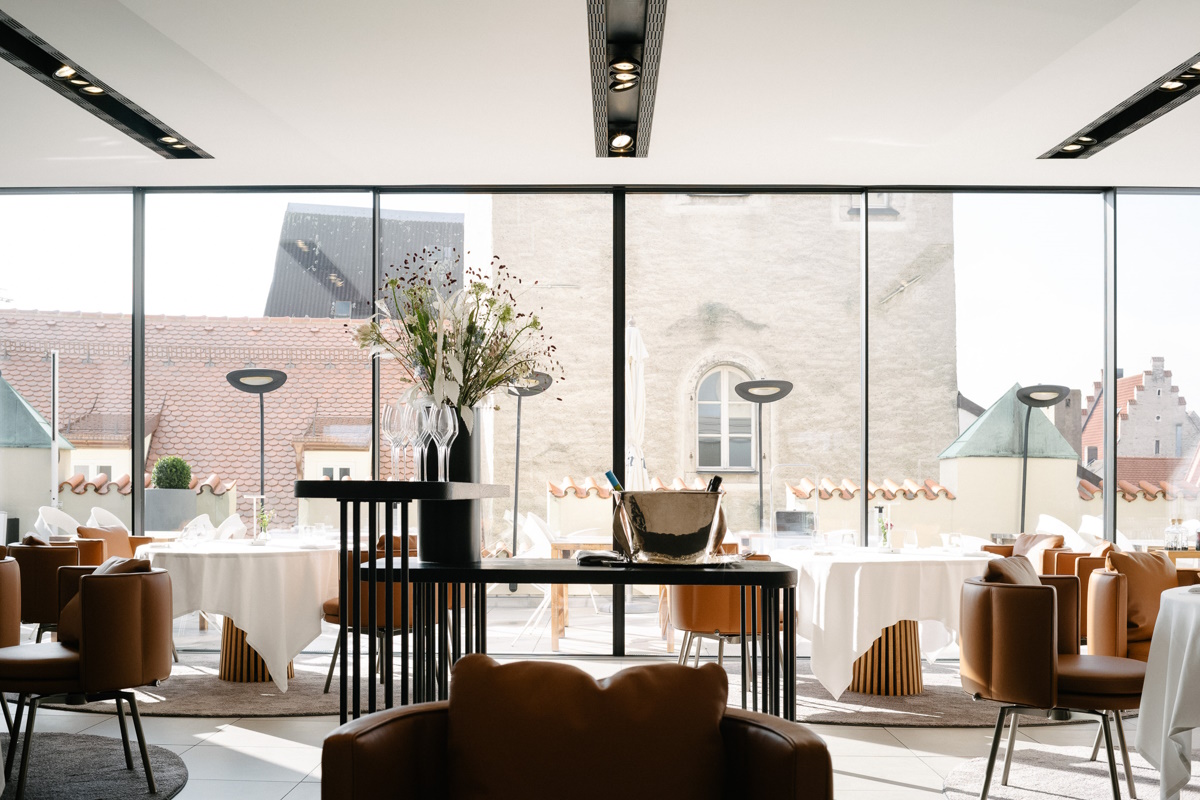
Image: Michael Krug
Food has to make you happy
Anton Schmaus is a passionate chef and host. He grew up in his parents’ inn, and at the age of ten he enrolled at the Catholic boarding school in Metten Abbey; as he recalls in his cookbook “Anton Schmaus cooks,” he noticed a big difference there: “At home, I’d learned what good food tastes like. Now, at times, food was something I just had to endure.” But what proved most important for his future were boarding school’s tightly scheduled daily routines and strictly regulated meal times, which taught him the discipline that would later serve him well as a chef: “The boarding school toughened me up in a way. It taught me to see things through, to keep pushing ahead even when the path gets steep, rocky and slippery.”
Anton Schmaus has since become one of Germany’s most famous restaurateurs – and not only thanks to the Michelin star his Storstad has held every year since its 2015 opening. As head chef of the German national football team since 2017, he’s also responsible for feeding Kai Havertz, Florian Wirtz, Jamal Musiala, and all the rest. “This job isn’t just about cooking the healthiest food possible. You have to have a sense for the right mixture of nutritional science and soul food. Food has to make you happy!”
In an interview with KTCHNrebel, Anton Schmaus explained that food has an important role to play – especially at the European Championships Germany hosted in summer 2024: “Of course, there are precise plans for when the players are supposed to get something to eat in order to perform at their absolute best. But you also need to help keep spirits up. When you’re all together for several weeks at a tournament, for example, you can’t just serve the broccoli steamed or blanched every single day. It doesn’t hurt to offer broccoli tempura every so often. And the occasional pastry can put smiles on everyone’s faces.”

Image: Michael Krug
A common goal
As a chef, Anton Schmaus says, “I am very close to the players. After all, they spend more time around me than they do practicing on the pitch.” So it’s no surprise that the players treat their “Schmausi” with such warmth, respect and honesty. “Thomas Müller, for example, who ended his team career this past summer, was always deeply interested in the subject of nutrition. But even younger players have strong opinions on things like whether they prefer to eat pasta or rice on game day.” Our job in the kitchen is to offer them an optimal selection of food.”
Anton Schmaus says that, for him personally, it’s “a huge honor to get to work for the DFB team.” Even though it means periodically running his own businesses in absentia, the career advantages outweigh the disadvantages. “And not just because it creates value for the ‘Anton Schmaus’ brand,” he adds. “Of the 340 Michelin-starred chefs in Germany, I’m the only one who’s the chef of the men’s football national team.”
Even more important is the experience of being part of a team that’s so professional at every level: “Normally, I manage 40 to 50 employees myself. At the DFB, I’m just one part of the whole. I learn a lot from the coach and the sports director about leadership.” According to Anton Schmaus, this is the most important factor to success: “Whether you’re in a stadium or a restaurant, you have to surround yourself with people who all have the same goal and are willing to give everything for it.”
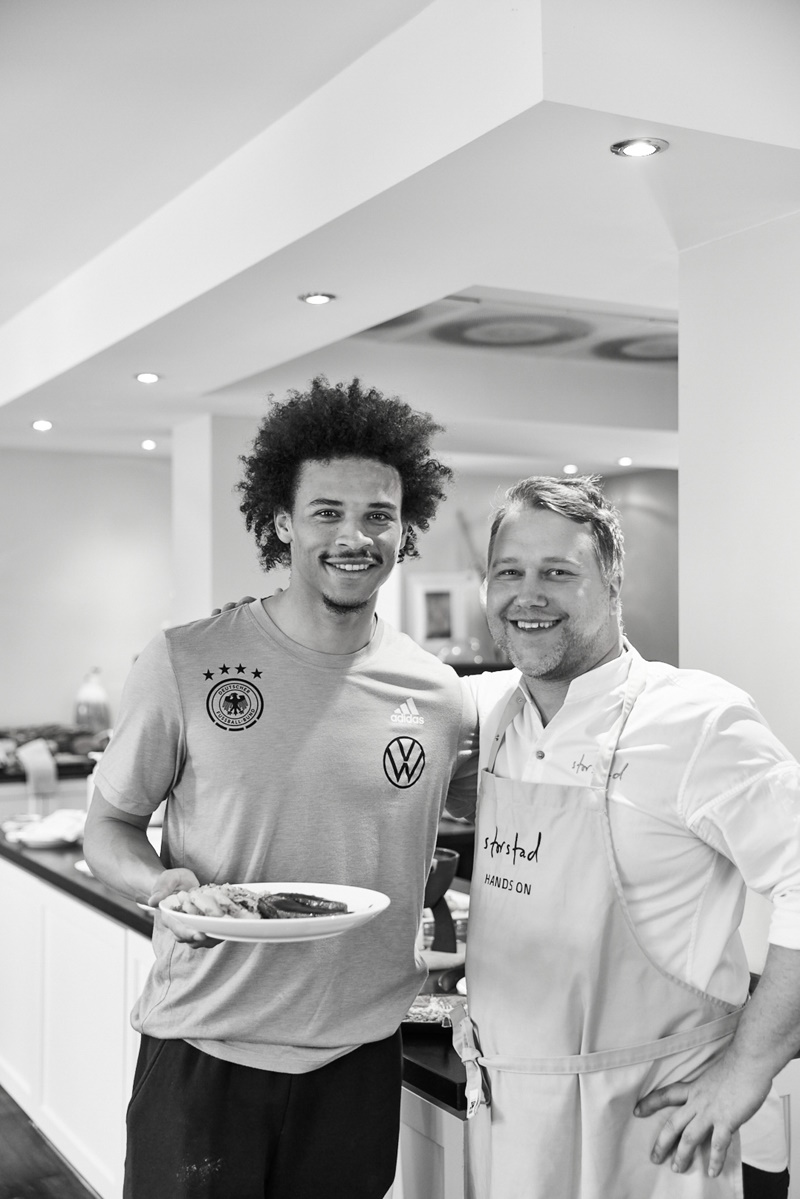
Image: David Loftus
A passion for new ideas
Anton Schmaus founded his restaurant empire before he started working with the national team, and he’s still building it today. The former bar area of his casual fine dining restaurant Storstad (the Swedish word for “city”) is home to a sushi bar called Aska, which has had its own Michelin star since 2021. And then there’s his “nasty fusion kitchen” Sticky Fingers, his wine bar Tipsy, and his high-end delivery service Proviant, which even features private dining with Anton Schmaus.
The now-husband and father believed in his own abilities from a young age. “Even back in elementary school, I knew I’d be a Michelin-starred chef when I grew up.” He owes the fact that his vision became a reality in Regensburg, just under an hour’s drive west from his home town of Viechtach, to “a lucky coincidence.” He’d shared an apartment in Bavaria’s fourth-largest city, a town of nearly 160,000 people, for a time after doing his civil service and never quite lost contact. “One day, a real estate agent’s daughter told me that her dad supposedly had a cool property in his portfolio…”
After spending a few years hiking around Switzerland, Sweden and the USA (with Thomas Keller, one of Grant Achatz’s teachers), Anton Schmaus transformed that “cool property” into his first restaurant. And his first success story: by 2010, after just 16 months, he’d cooked his way to a Michelin star at the Historisches Eck. The fact that the lease expired a few years later ultimately proved a stroke of luck: “I had the star, but the location only seated 30 – it was just too small to allow me to develop.”
In 2014, the fourth floor of the building across the road – Goliath House, an imposing Early Gothic structure from the 13th century with views overlooking the city rooftops – opened up, and Anton Schmaus was finally able to start making his big ideas happen. “I knew I wanted to get back to Michelin Star quality at Storstad. But I wanted more – and I still do: I’m just passionate about creating new concepts over and over. I put my ideas under the microscope every year – just because something works doesn’t mean you have to keep doing it forever.”
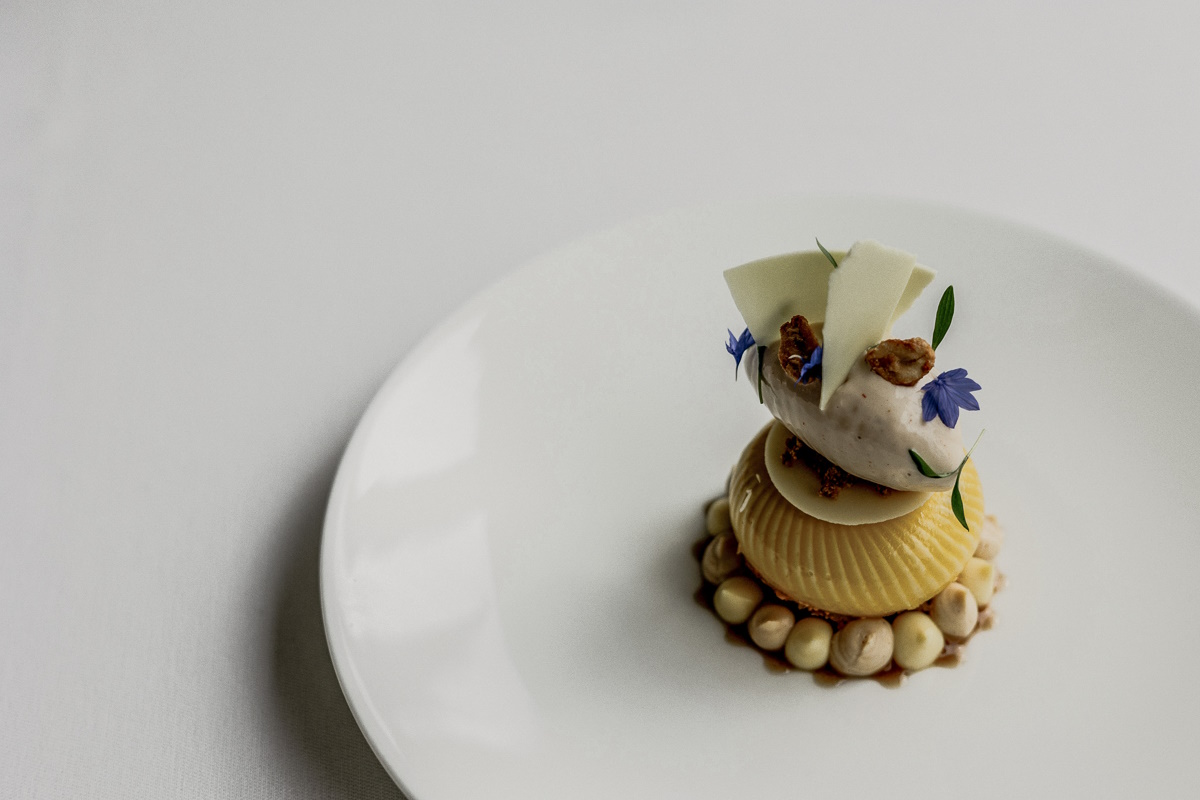
Image: Michael Krug
The signs of the times
The only constant is change. “Even having the nicest restaurant in the world does you no good if people don’t come to you. Because your food’s good, but you’re cooking your way past the spirit of the times. Or because guests aren’t willing to spend that much money at the moment.” That’s why Anton Schmaus isn’t afraid to keep shaking up his menus in response to social trends: “Look, at our inn back home, the menu was obviously very meat-heavy, but a lot has changed in the meantime – including for me personally. Vegetarian and vegan foods have become an important part of my own diet.”
Not least because, as head chef of the national football team, he has started to pay even more attention to his ingredients and the preparation of his dishes: ‘We have been working with Rational appliances for a long time to ensure consistent quality at the highest level. However, I realised that we need to adjust in certain areas. That’s why we’ve been offering vegetarian and vegan alternatives in all my restaurants for six years now – and at a level that is in no way inferior to meat dishes in terms of content and craftsmanship.’
His observations from the sports world help him put a positive spin on supposed setbacks: in football, players often kick the ball into the backfield for tactical reasons, to open up space up in front and create new opportunities. “Obviously, we do our work well. But as a chef, I always have to ask myself: Are we evolving? Are we noticing the signs of the times? Is fine dining still on trend?”
In a world changing ever more rapidly, Anton Schmaus’s response is to offer more options. For example, sushi bar Aska, right next to the city center (which he developed while a chef in F12, Stockholm’s best restaurant at the time): “At Storstad, of course, we’re rooted in Scandinavian culture, but our cooking’s always been classically French… and now we have the opportunity to allow Japanese notes from Aska to flow into Storstad. Ultimately, though, it’s mostly about making customers happy: food has to be seasoned well, it should never taste bland.”

Image: David Loftus
Big dreams of a little cottage
Even ten years after opening Storstad, Anton Schmaus says he still hasn’t peaked: I still adore cooking; the kitchen is my natural habitat. But now my role has changed, obviously. These days, my main job is to set the course for our development.” He’s not actively seeking out a second Michelin star. “I only focus on what fascinates and drives me. My creativity is a huge driving force. It does mean that I’m rarely satisfied, but it helps me continuously improve myself and my restaurants.”
These days, though, the “stubborn Lower Bavarian ox” is prepared to make certain compromises. “Gastronomy is currently going through a phase of comprehensive challenges. We don’t exist independently of everything that’s happening in the world. At the moment, we are more about stability and moving forward in small steps. Since the coronavirus pandemic, I’ve also learned to only plan from year to year.” As far as his own future is concerned, Anton Schmaus and his Swedish wife have a more modest vision: “I love Regensburg. I met my wife here, too. But 20 years from now, I’d rather be living in a nice little cottage somewhere in Sweden.”


